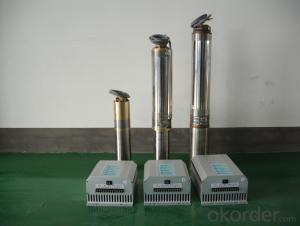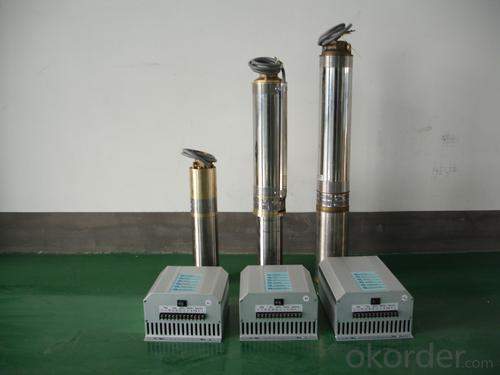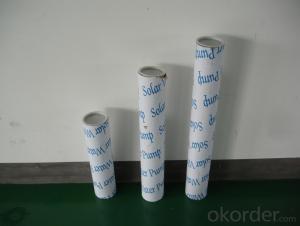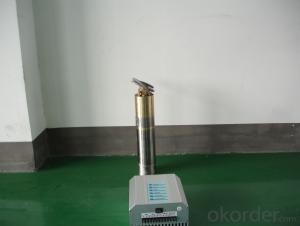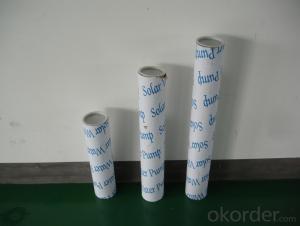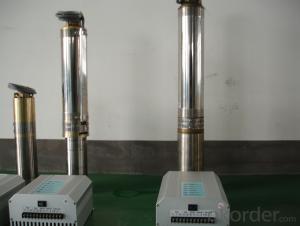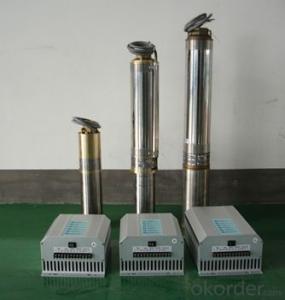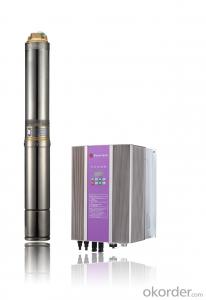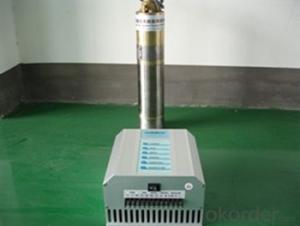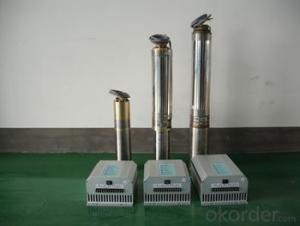Grundfos Solar Pump (DC)
- Loading Port:
- China Main Port
- Payment Terms:
- TT OR LC
- Min Order Qty:
- -
- Supply Capability:
- -
OKorder Service Pledge
OKorder Financial Service
You Might Also Like
Item Description :
This superb new addition to our solar fountain range comes with a 10w solar panel,and a powerful fountain pump that is capable of producing fountains of up to 2m in height. As well as being easy to set up and use.Instruction manual is supplied for assembly and maintenance.
Solar Fountain Key Features :
Powered by direct sunlight
No high voltage electric mains required
Safe for children
Max. height of fountain: 2M
Max. flow capacity: 800 L/H(176 GAL)
10W Polycrystalline solar panel included
18V DC brushless pump
Solar Pump Features :
Can produce fountains up to : 2M (tube height) 1.4M (fountain height)
Comes with multiple nozzle accessories
Cable Length : 5M
Solar Panel Features :
10W peak power.
Polycrystalline highly efficient solar panel
Comes mounted in aluminium frame
Comes with ground stake and rotating knob so you can angle your panel toward the sun
What You Will Get :
10W solar panel
Solar pump
Ground Sake
Nozzle accessories
Precautions :
DO NOT alter or change the product itself or its components
Operate pump in freshwater only, never above 50 degrees celsius
Keep away from flammable liquids
Do not connect to any other power supply other than the included
- Q: Can a solar pump be used for water circulation in hot tubs or spas?
- Yes, a solar pump can be used for water circulation in hot tubs or spas. Solar pumps are designed to circulate water using solar energy, making them an eco-friendly and cost-effective option for hot tubs or spas. They can help maintain water quality, prevent stagnation, and provide the necessary filtration and circulation required for a relaxing and enjoyable spa experience.
- Q: Can a solar pump be used for water supply in off-grid cabins?
- Yes, a solar pump can be used for water supply in off-grid cabins. Solar pumps are powered by solar energy and can efficiently pump water from a well or other water sources to provide a reliable water supply in remote locations without access to electricity. They are a sustainable and cost-effective solution for off-grid cabins.
- Q: Are there any environmental benefits of using a solar pump?
- Using solar pumps has numerous environmental advantages. Firstly, these pumps rely solely on renewable energy from the sun, eliminating the need for fossil fuels and greatly reducing greenhouse gas emissions, air pollution, and dependence on non-renewable energy sources. This not only helps combat climate change but also improves air quality. Secondly, solar pumps operate without consuming any water or natural resources. They utilize solar panels to convert sunlight into electricity, enabling the pump to extract water from underground or surface sources. This sustainable approach to water pumping ensures the conservation of water resources, making them available for various other purposes like agriculture, sanitation, and drinking water. Moreover, solar pumps prove to be highly beneficial for irrigation in agriculture. By harnessing solar power for irrigation, farmers can decrease their reliance on non-renewable energy sources such as diesel generators or electric pumps. This leads to a substantial reduction in carbon emissions and encourages the adoption of sustainable agricultural practices. Furthermore, solar pumps are particularly advantageous in remote areas with limited or no access to electricity. In these locations, solar pumps not only provide a clean and dependable water source but also eliminate the need for expensive and environmentally harmful alternatives like diesel-powered generators or the transportation of fuel for traditional pumps. In conclusion, the utilization of solar pumps offers diverse environmental benefits, including the reduction of greenhouse gas emissions, air pollution, and water consumption. Additionally, solar pumps promote sustainable agriculture and provide clean water in remote areas.
- Q: How does a solar pump handle water with high levels of calcium or magnesium?
- A solar pump can handle water with high levels of calcium or magnesium without any issues. The pump's mechanism does not get affected by the presence of these minerals, and it continues to function as usual, efficiently pumping water using solar energy.
- Q: Can a solar pump be used for water supply in off-grid fish farms?
- Certainly, off-grid fish farms can utilize solar pumps for their water supply. Solar pumps prove to be an exceptional and sustainable option for delivering water to fish farms situated in remote areas where access to grid electricity is unavailable. These pumps are driven by solar energy, eliminating the need for any external power source or fuel, making them both economical and eco-friendly. Solar pumps can effectively extract water from sources like rivers, lakes, or boreholes and transport it to the fish ponds or tanks. They can be designed to provide a steady flow of water, ensuring that the fish receive an ample supply for their growth and well-being. The utilization of solar pumps in off-grid fish farms presents several advantages. Firstly, it reduces reliance on expensive and unreliable fossil fuels and grid electricity, particularly in secluded locations. Solar pumps operate by harnessing the abundant and renewable power of sunlight, offering a sustainable solution for long-term water supply. Moreover, solar pumps necessitate minimal maintenance as they possess fewer moving parts compared to conventional pumps. This reduces the risk of mechanical failures and the frequency of repairs, leading to decreased operational costs and heightened efficiency. Furthermore, integrating solar pumps into existing fish farm infrastructure requires minimal modifications. They are available in various sizes and capacities, enabling customization based on the specific water requirements of the fish farm. In conclusion, the usage of a solar pump is indeed feasible for water supply in off-grid fish farms. It provides a dependable, cost-effective, and environmentally friendly solution, ensuring a continuous and sustainable water supply to support the growth and health of fish in remote locations.
- Q: Are there any government incentives or subsidies for using solar pumps?
- Solar pumps can benefit from government incentives and subsidies. Governments worldwide understand the importance of promoting renewable energy, such as solar power, and have introduced various programs and incentives to encourage the adoption of solar pumps. Tax credits and rebates are a popular form of incentive provided by many governments. Individuals and businesses that invest in solar pump systems can receive these credits or rebates, significantly reducing the upfront costs of purchasing and installing solar pumps. As a result, solar pumps become more affordable and appealing to consumers. In addition to tax credits and rebates, some governments offer grants or subsidies specifically aimed at promoting the use of solar pumps in certain sectors or regions. These grants help offset the costs of purchasing and installing solar pump systems, making them more accessible to farmers, rural communities, or areas with limited access to electricity. Moreover, certain governments have implemented net metering policies, allowing individuals or businesses with solar pumps to sell excess electricity generated back to the grid. This not only leads to significant savings on electricity bills but can also generate additional income for the system owner. It is important to note that the availability and details of these incentives and subsidies can vary from country to country and even within different regions of the same country. Therefore, it is advisable to consult the local government or relevant authorities for accurate and up-to-date information on the specific incentives and subsidies available for using solar pumps in a particular location.
- Q: Can a solar pump be used in areas with limited access to water monitoring systems?
- Yes, a solar pump can be used in areas with limited access to water monitoring systems. Since solar pumps run on solar energy and do not require grid electricity, they can be installed in remote locations without the need for a power source. While water monitoring systems are beneficial for tracking water usage and quality, a solar pump can still provide reliable access to water in areas where monitoring systems are not available or accessible.
- Q: Can a solar pump be used at night?
- No, a solar pump cannot be used at night as it relies on sunlight to generate power and operate efficiently.
- Q: Can a solar pump be used for water supply in refugee camps?
- Yes, a solar pump can be used for water supply in refugee camps. Solar pumps are an effective and sustainable solution as they utilize solar energy to power the pump, eliminating the need for electricity or fuel. They can provide a reliable and cost-effective water supply, especially in areas with limited access to electricity or unreliable power grids. Additionally, solar pumps are low maintenance, eco-friendly, and can be easily installed and operated, making them suitable for water supply in refugee camps.
- Q: How does a solar pump handle water with high levels of iron?
- A solar pump can handle water with high levels of iron by using filtration systems or chemical treatments to remove or reduce the iron content. This ensures that the pump's components and the water being pumped remain unaffected by the presence of iron, allowing for efficient and reliable operation.
Send your message to us
Grundfos Solar Pump (DC)
- Loading Port:
- China Main Port
- Payment Terms:
- TT OR LC
- Min Order Qty:
- -
- Supply Capability:
- -
OKorder Service Pledge
OKorder Financial Service
Similar products
Hot products
Hot Searches
Related keywords
